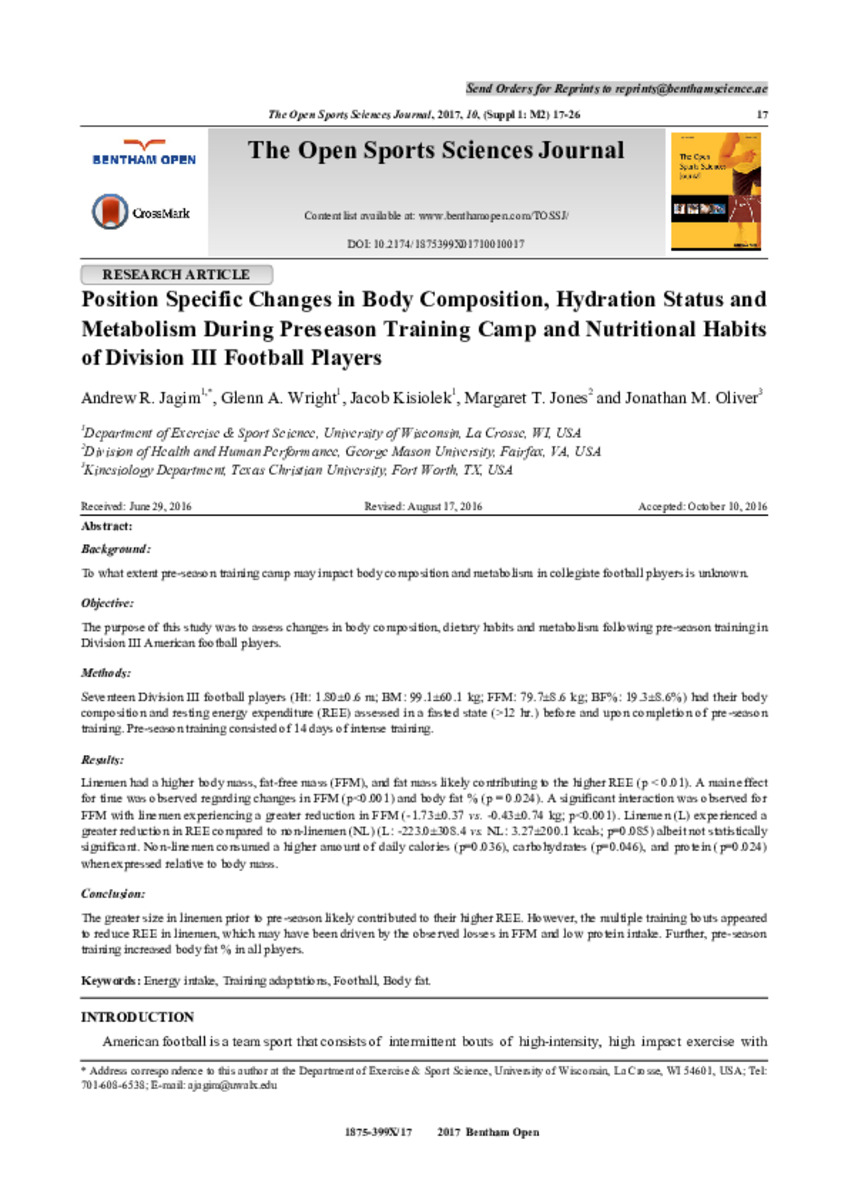Position Specific Changes in Body Composition, Hydration Status and Metabolism During Preseason Training Camp and Nutritional Habits of Division III Football PlayersShow full item record
| Title | Position Specific Changes in Body Composition, Hydration Status and Metabolism During Preseason Training Camp and Nutritional Habits of Division III Football Players |
|---|---|
| Author | Jagim, Andrew R.; Wright, Glenn A.; Kisiolek, Jacob; Jones, Margaret T.; Oliver, Jonathan M. |
| Date | 2017-04-28 |
| Abstract | Background: To what extent pre-season training camp may impact body composition and metabolism in collegiate football players is unknown. Objective: The purpose of this study was to assess changes in body composition, dietary habits and metabolism following pre-season training in Division III American football players. Methods: Seventeen Division III football players (Ht: 1.80 ± 0.6 m; BM: 99.1 ± 60.1 kg; FFM: 79.7 ± 8.6 kg; BF%: 19.3 ± 8.6%) had their body composition and resting energy expenditure (REE) assessed in a fasted state (>12 hr.) before and upon completion of pre-season training. Pre-season training consisted of 14 days of intense training. Results: Linemen had a higher body mass, fat-free mass (FFM), and fat mass likely contributing to the higher REE (p < 0.01). A main effect for time was observed regarding changes in FFM (p<0.001) and body fat % (p = 0.024). A significant interaction was observed for FFM with linemen experiencing a greater reduction in FFM (-1.73 ± 0.37 vs. -0.43 ± 0.74 kg; p<0.001). Linemen (L) experienced a greater reduction in REE compared to non-linemen (NL) (L: -223.0 ± 308.4 vs. NL: 3.27 ± 200.1 kcals; p=0.085) albeit not statistically significant. Non-linemen consumed a higher amount of daily calories (p=0.036), carbohydrates (p=0.046), and protein (p=0.024) when expressed relative to body mass. Conclusion: The greater size in linemen prior to pre-season likely contributed to their higher REE. However, the multiple training bouts appeared to reduce REE in linemen, which may have been driven by the observed losses in FFM and low protein intake. Further, pre-season training increased body fat % in all players. |
| Link | https://doi.org/10.2174/1875399x01710010017
https://repository.tcu.edu/handle/116099117/39799 https://opensportssciencesjournal.com/VOLUME/10/PAGE/17/ |
| Department | Kinesiology |
| Subject | Energy intake
Training adaptations Football Body fat |
Files in this item
This item appears in the following Collection(s)
- Research Publications [1008]
© TCU Library 2015 | Contact Special Collections |
HTML Sitemap




